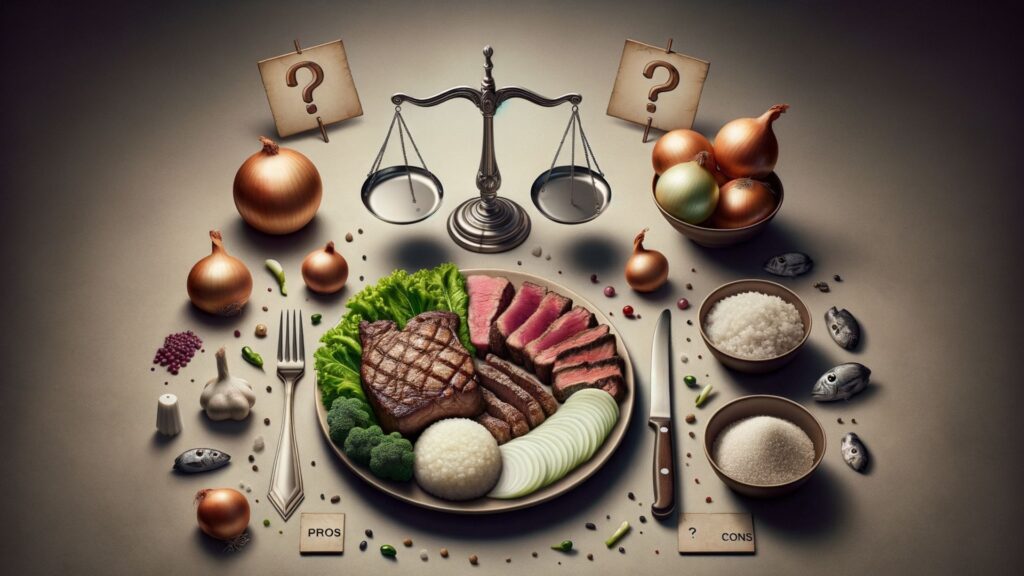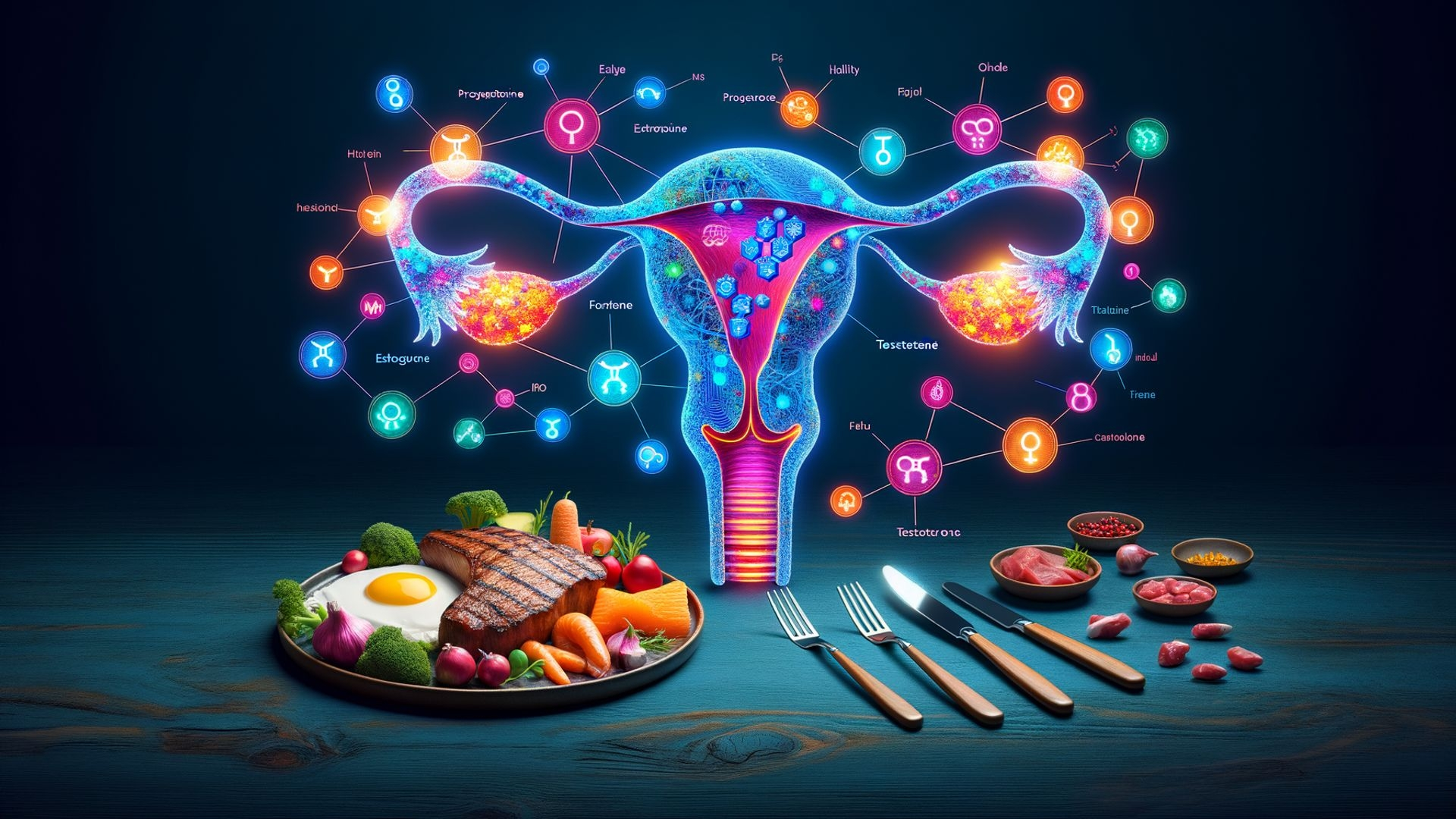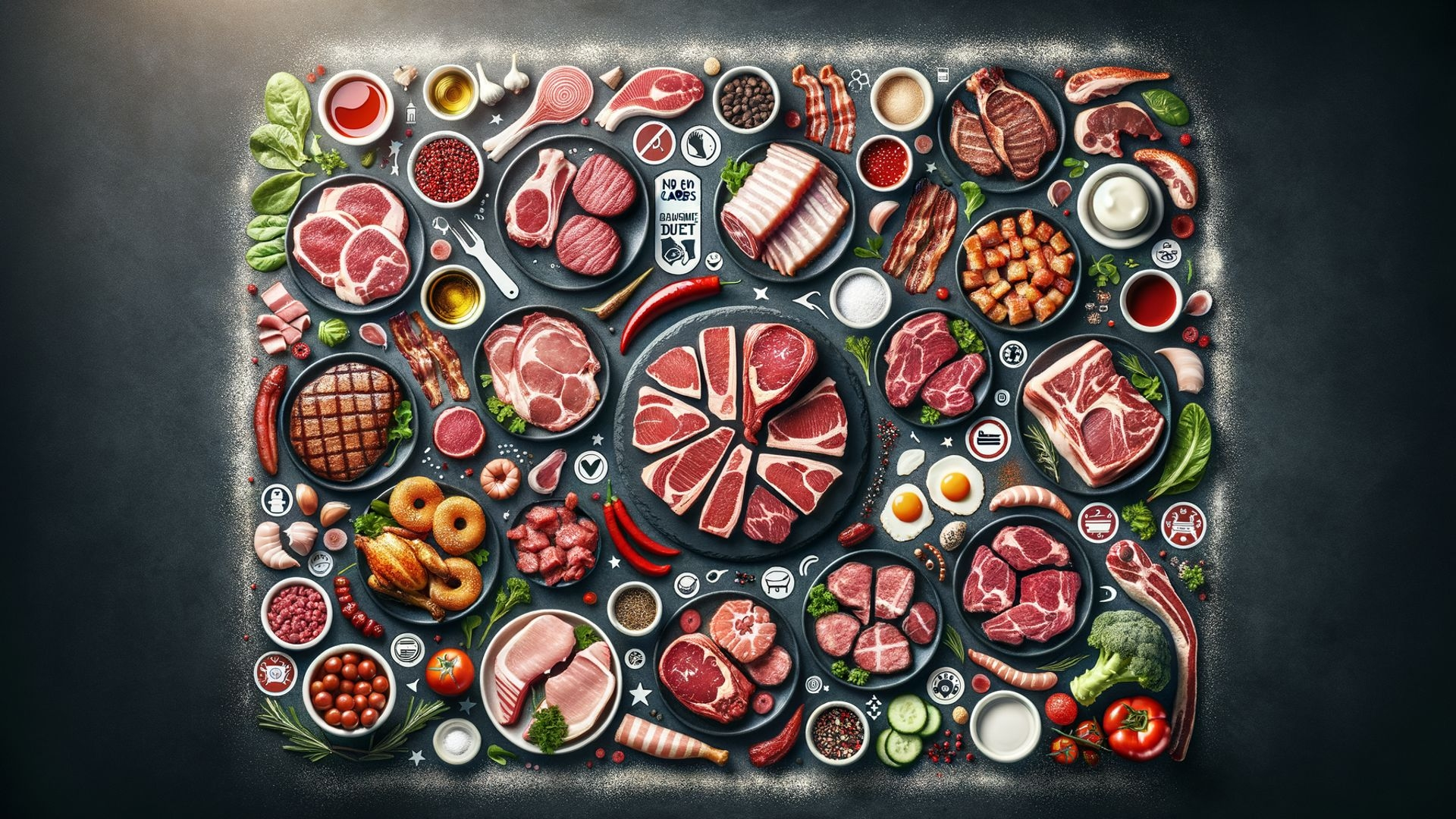Eat Onions on Carnivore Diet: Onions and the World Carnivore Tribe
A carnivore diet involves consuming animal-based products exclusively while excluding plant foods. This dietary approach has gained popularity for its potential health benefits a carnivore diet, educates individuals on the benefits of adopting a strict carnivore diet. He emphasizes the importance of animal products as the primary source of added nutrients in this eating plan. Some benefits of a carnivore diet may include improved digestion, increased energy levels, weight loss, and better mental clarity. Advocates of this diet believe that animal products provide all the essential nutrients that the body needs, including protein, healthy fats, vitamins, and minerals.
Carnivore-supportive doctors also emphasize the importance of sourcing high-quality animal products from pastured or grass-fed animals to ensure optimal nutrient content. He suggests incorporating a variety of animal-based foods such as organ meats, bone broth, and seafood to obtain a wide range of nutrients.
While a carnivore diet may have some potential benefits, it is important to consult with a healthcare professional before making any drastic changes to your diet. It is also important to listen to your body and make sure you are getting a balanced intake of nutrients to support overall health and well-being.
Overall, a carnivore diet may be worth considering for some individuals who are looking to improve their health and well-being, but it is essential to approach it carefully and thoughtfully to ensure it is sustainable and meets your individual nutritional needs. Onions are often a point of contention in the carnivore community due to their classification as a plant food.
While the carnivore diet generally excludes plant foods, some individuals choose to include onions in their diet due to the small amounts of nutrients they provide. Onions contain certain vitamins and important minerals that may be beneficial, and some argue that they can be included in small amounts without significantly impacting the benefits of a carnivore diet.
The Basics of a Carnivore Diet
What is a carnivore diet?
A carnivore diet is a dietary approach that focuses on consuming animal-based foods exclusively while excluding plant foods. This means that individuals following a carnivore diet primarily eat meat, fish, eggs, and other animal products. The carnivore diet is based on the belief that our ancestors commonly consumed animal foods and that our bodies are best adapted to digest and utilize these types of foods. Proponents of the carnivore diet claim that it can improve digestion, mental clarity, energy levels, and overall health.
Some potential benefits of a carnivore diet include weight loss, improved blood sugar control, reduced inflammation, and relief from digestive issues. However, critics argue that a diet that excludes plant foods may lead to nutrient deficiencies, particularly in terms of fiber, antioxidants, and certain vitamins and minerals.
It’s essential for individuals considering a carnivore diet to consult with a healthcare professional or registered dietitian to ensure they are meeting their nutritional needs and to monitor their health throughout the process. It’s also important to remember that dietary needs can vary from person to person, and what works for one individual may not work for another.
How do Carnivore supportive doctors promote the carnivore diet?
Advocates of carnivore diet, promote the consumption of animal-based products, particularly those from ruminant animals. He emphasizes the benefits of eliminating processed meats and sugars, citing the nutrient density of animal products. Carnivore-supportive doctors contend that this dietary approach can enhance digestion, reduce inflammation, and boost energy levels while aiding in weight loss and mental clarity. He underscores the importance of essential nutrients like protein, healthy fats, and vitamins found abundantly in animal-based foods, which may be lacking in plant-based sources. Carnivore-supportive doctors advise individuals to observe their body’s response to different foods, recommending a gradual transition to the carnivore diet. He suggests integrating organ meats and bone broth to maximize nutrient intake. Despite the controversy, Carnivore’s supportive doctors believe the carnivore diet offers health benefits, particularly for those seeking to optimize well-being through animal-based nutrition.
What role do onions play in a carnivore diet?
While the carnivore diet typically excludes plant foods like onions, some individuals choose to include small amounts of onions for their nutrient content. Onions are rich in certain vitamins and minerals, making them a debated topic within the carnivore community. Some proponents of the carnivore diet argue that onions should be avoided due to their potential to cause digestive issues and impact gut health. However, others believe that small amounts of onions can be beneficial for adding flavor to meals and providing additional nutrients.
Those who want to include onions in their carnivore diet typically do so in moderation, consuming them sparingly and monitoring their individual response. It is important for individuals following the carnivore diet to listen to their bodies and adjust their food choices accordingly.
Ultimately, whether or not to include onions in a carnivore diet is a personal decision that should be based on individual preferences and health goals. It is always recommended to consult with a healthcare provider or nutritionist before making significant changes to your diet.

Benefits of a Carnivore Diet
How does a carnivore diet impact the body?
A carnivore diet can have various impacts on the body, including potential benefits such as improved weight management, increased energy levels, and better blood sugar control. By focusing on animal-based foods, individuals may experience health improvements in their overall health and well-being.
However, there are also potential risks associated with a carnivore diet. Consuming large amounts of red meat and animal products can increase the risk of heart disease, cancer, and other chronic illnesses. A lack of fiber from fruits, vegetables, and whole grains can also lead to digestive issues such as constipation.
Additionally, a carnivore diet may lack essential nutrients such as fiber, vitamins, and minerals that are important for overall health. It is important for individuals following a carnivore diet to work with a healthcare provider or nutritionist to ensure they are meeting their nutritional needs and to monitor for any potential deficiencies.
In conclusion, while a carnivore diet may offer some benefits, it is important to consider the potential risks and ensure that individuals are consuming a well-rounded and balanced diet to support their overall health and well-being.
What is the World Carnivore Tribe and how does it support this diet?
A carnivore diet can trigger significant changes in the body, potentially yielding benefits like enhanced weight management, heightened energy levels, and improved blood sugar regulation. By prioritizing animal-based foods, individuals may witness overall health enhancements. However, accompanying these advantages are potential risks. Excessive consumption of red meat and animal products might elevate the likelihood of heart disease, cancer, and other chronic ailments. Moreover, the absence of fiber from fruits, vegetables, and whole grains could precipitate digestive complications like constipation.
Furthermore, a carnivore diet may fall short in providing essential micronutrients such as fiber, vitamins, and minerals crucial for holistic health. Hence, individuals adhering to this regimen should collaborate with healthcare providers or nutritionists to ensure adequate nutrient intake and monitor for potential deficiencies. In conclusion, while embracing a carnivore diet may offer certain advantages, it’s imperative to acknowledge the potential hazards and ensure consumption of a well-rounded, balanced diet. Exploring flexible versions of the carnivore diet and incorporating appropriate dietary changes can better support overall health and well-being.
Navigating Plant Foods in a Carnivore Diet
Can you eat onions on a carnivore diet?
While the carnivore diet typically excludes plant foods, some individuals choose to include onions in small amounts for their potential health benefits. Onions contain vitamins, minerals, and prebiotics that some believe can support a healthy gut. Onions are a good source of vitamin C, which is essential for immune system function and skin health. They also contain fiber, which can help support digestive health and regulate bowel movements.
Additionally, onions contain prebiotics, which are a type of fiber that feed the beneficial bacteria in your gut. This can help promote a healthy balance of gut bacteria, which is important for overall health.
Some people on the carnivore diet choose to include onions in small amounts because they believe that the potential health benefits outweigh the potential drawbacks of consuming a small amount of plant matter. However, it’s important to note that everyone is different and may react differently to onions, so it’s best to listen to your body and see how it responds.
If you choose to include onions in your carnivore diet, it’s best to do so in moderation and pay attention to how your body reacts. If you experience any negative withdrawal symptoms, it may be best to avoid onions and stick to a strict carnivore diet. As always, it’s important to consult with a healthcare provider before making any significant changes to your diet.

What are the considerations for consuming plant foods on a carnivore diet?
When considering plant foods like onions within a carnivore diet, assessing their nutrient content and potential impact on overall health is essential. Some individuals find that incorporating small amounts of plant foods can complement their primarily animal-based diet. Onions, being low in calories yet nutrient-dense, offer a range of vitamins and minerals such as vitamin C, vitamin B6, folate, and potassium. Additionally, their antioxidant properties may aid in shielding the body against oxidative stress and inflammation.
Nevertheless, some proponents of the carnivore diet contend that plant foods like onions contain anti-nutrients such as lectins and phytates, which could impede nutrient absorption or induce digestive discomfort in certain individuals. It’s noteworthy that cooking or fermenting onions can mitigate these anti-nutrients.
Ultimately, the decision to include onions in a carnivore diet is individual and contingent upon tolerance levels and objectives. While some carnivores opt to abstain from onions entirely, others find that modest amounts can be incorporated without adverse effects on health or digestion.
Monitoring how onions influence overall well-being and listening to the body’s responses is paramount. Should any concerns or adverse reactions arise, it may be prudent to eschew onions and adhere strictly to a carnivorous diet. Seeking guidance from healthcare providers or nutritionists can offer personalized insights and support when navigating dietary choices, ensuring alignment with individual needs and goals.
How should individuals on a carnivore diet approach electrolyte intake from plant foods?
Electrolytes play a pivotal role in bodily functions, and those adhering to an all-meat carnivore diet might need to explore alternative sources for electrolyte replenishment, especially if incorporating plant foods like onions. Maintaining proper electrolyte balance is paramount for overall health and vitality. Onions, boasting a significant potassium content, stand out as a valuable electrolyte source, crucial for regulating fluid balance, muscle contractions, and nerve transmissions.
Given the limited food selection of a carnivore diet, individuals might fall short on potassium intake, making onions or other potassium-rich plant foods an essential inclusion to meet electrolyte needs. Furthermore, onions offer additional electrolytes such as calcium, magnesium, and phosphorus, vital for skeletal strength, muscle performance, and energy generation. Diversifying the diet with a spectrum of plant foods ensures a well-rounded electrolyte profile, fostering overall health.
For those on a carnivore regimen concerned about electrolyte adequacy, exploring electrolyte-rich beverages or supplements could be beneficial. Prioritizing self-awareness and seeking guidance from healthcare providers or nutritionists ensures a tailored approach to electrolyte management, optimizing health and well-being without compromising dietary preferences.
Key Tips by Carnivore Supportive Doctors Following a Carnivore Diet by
What are some recommended animal fats for a carnivore diet?
Animal fats like liver, tallow, and lard are popular choices for individuals following a carnivore diet. These fats are rich in nutrients and provide essential fatty acids that support overall health. Liver is especially prized for its high concentration of vitamins and minerals, including vitamin A, vitamin B12, iron, and zinc.
Tallow, which is rendered beef or lamb fat, ribeye steak is another nutrient-dense option that is high in healthy saturated fats. Lard, made from rendered pig fat, is also a popular choice due to its rich flavor and versatility in cooking.
Animal fats can be used in a variety of ways on a carnivore diet, including frying, roasting, and sautéing meats and vegetables. They can also be incorporated into sauces, dressings, and spreads to add flavor and richness to meals.
In addition to providing essential nutrients, animal fats are also a great source of energy on a carnivore diet, helping to sustain feelings of fullness and satiety throughout the day. Incorporating a variety of animal fats into meals can help ensure a well-rounded and nutrient-dense diet while following a carnivore lifestyle.
How much water should one drink on a carnivore diet?
Staying hydrated is essential on a carnivore diet, and individuals are advised to drink an adequate amount of water based on their individual needs. Consuming enough water supports various bodily functions and overall well-being.
On a carnivore diet, it is important to listen to your body’s signals and drink water whenever you feel thirsty. Some people may find that they need to drink more water on a carnivore diet due to the lack of water content in meat compared to fruits and vegetables. It is also important to be aware of your activity level, the climate you live in, and any other factors that may affect your hydration needs.
In addition to water, some carnivores may choose to incorporate other beverages such as herbal tea or bone broth into their diet to help maintain hydration levels. These beverages can provide added flavor and nutrients while still supporting overall hydration.
Overall, staying properly hydrated is crucial for optimal health and well-being on a carnivore diet. By listening to your body’s signals and consuming an adequate amount of water, you can support your body’s functions and feel your best while following a carnivore diet.

How to avoid hidden sugars while following a carnivore diet?
Processed foods often contain hidden sugars that can negatively impact health and well-being. Individuals following a carnivore diet should read labels carefully and opt for whole, unprocessed foods to avoid hidden sugars and maintain the integrity of their dietary approach. Hidden sugars can be found in packaged foods such as condiments, sauces, dressings, and even in seemingly healthy options like protein bars or granola.
These added sugars can contribute to inflammation, weight gain, and other negative health effects.
By choosing whole foods like meats, eggs, seafood, and non-starchy vegetables, individuals following a carnivore diet can eliminate the risk of consuming hidden sugars. It’s important to also be mindful of any seasoning or marinades used on meats, as these can sometimes contain added sugars as well.
It may take some extra effort to avoid hidden sugars while following a carnivore diet, but the benefits of improved health and well-being make it worth it. Reading labels, choosing whole foods, and cooking from scratch are important strategies to ensure a sugar-free diet and maintain the integrity of the carnivore approach.
Carnivore Diet vs. Processed Foods
What makes processed foods incompatible with a carnivore diet?
Processed foods are typically high in sugar, additives, and preservatives, making them incompatible with the principles of a carnivore diet. These foods lack the nutrient density of animal-based products and may negatively impact overall health.
Additionally, processed foods can also lead to inflammation in the body, which can worsen existing health conditions and contribute to weight gain. The artificial ingredients and chemicals in these foods can disrupt your gut microbiome and lead to digestive issues.
On a carnivore diet, the focus is on consuming whole, nutrient-dense animal products such as meat, fish, eggs, and dairy. These foods provide essential nutrients like protein, vitamins, and minerals that are necessary for overall health and well-being.
By avoiding processed foods and sticking to a diet centered around animal products, you can support your body’s natural processes, improve your energy levels, and promote optimal health. It’s important to prioritize whole, minimally processed foods to ensure that you are getting the nutrients your body needs to thrive.
How does the nutrient profile differ between a carnivore diet and processed foods?
The nutrient profile of a carnivore diet is characterized by the rich array of vitamins, minerals, and healthy fats found in animal products. In contrast, processed foods often lack essential nutrients and may contribute to nutrient deficiencies over time.
Animal products such as meat, fish, poultry, and eggs are excellent sources of high-quality protein, which is essential for muscle growth and repair. They also contain important vitamins such as B vitamins (including B12), which are crucial for energy production and nerve function. Additionally, animal products are rich in minerals such as iron, zinc, and selenium, which play a key role in various bodily functions including immune function and hormone regulation.
Healthy fats found in animal products, such as omega-3 fatty acids, are important for brain health and reduce inflammation in the body. These fats are particularly abundant in fatty fish like salmon and mackerel.
In contrast, processed foods are often high in unhealthy fats, additives, and preservatives, which can have negative effects on health. These foods are typically low in essential nutrients like vitamins and minerals, and may contribute to nutrient deficiencies over time if consumed in excess.
Overall, a carnivore diet rich in animal products can provide a wide range of essential nutrients that are important for overall health and well-being. It is important to choose high-quality, unprocessed animal products and to consume a variety of foods to ensure a balanced nutrient intake.
Eat Onions on Carnivore Diet Frequently Asked Questions:
What is the carnivore diet and how does it differ from other diets?
The carnivore diet is a diet that excludes all plant-based foods and focuses solely on animal products such as meats, organ meats like liver, poultry, bone broth, and high-fat options like ribeye. This diet allows for high-protein and low-carb intake, eliminating plant foods to promote benefits such as satiating hunger and stabilizing blood sugar levels.
Could you provide more details on what a carnivore diet meal might look like?
A typical carnivore diet meal consists of animal products such as different cuts of meats, organ meats, poultry, bone broth, and high-fat options like ribeye. The diet emphasizes nose-to-tail consumption for a variety of nutrients and focuses on maximizing protein intake while completely excluding plant-based foods.
What are the potential health benefits of following a carnivore diet?
Some potential benefits of following a carnivore diet include weight loss, improved digestion, stabilized blood sugar levels, increased energy levels, and better mental focus. By eliminating plant foods and consuming nutrient-dense animal products, individuals may experience improved overall health and wellness.
Why are onions excluded from the carnivore diet?
Onions are excluded from the carnivore diet because they are a plant-based food that contains compounds like lectin and phytic acid, which are not allowed on the diet. Onions also contain high-carb content, making them incompatible with the low-carb nature of the carnivore diet.
Are there any specific versions of the carnivore diet that people follow?
Yes, some individuals follow variations of the carnivore diet, such as the nose-to-tail carnivore diet which emphasizes consuming all parts of the animal for a broad range of nutrients. Another version is the high-protein carnivore diet that prioritizes protein intake for muscle building and satiety.
How important is it to drink plenty of water while on a carnivore diet?
Staying hydrated is crucial while following a carnivore diet as it helps in digestion, absorption of nutrients, and overall bodily functions. Consuming an adequate amount of water can also help prevent dehydration, especially since the diet excludes foods with high water content like fruits and vegetables.
What are some recommended sources of essential nutrients like potassium and magnesium on a carnivore diet?
To ensure sufficient intake of nutrients like potassium and magnesium on a carnivore diet, individuals can consume foods such as organ meats, bone broth, and certain cuts of meat. These animal products provide essential minerals that may be lacking due to the elimination of plant-based foods.
Can onions be included in a strict carnivore diet?
No, onions cannot be included in a strict carnivore diet as they are a plant-based food. The diet focuses solely on animal products and strictly eliminates any plant matter.
How might adding onions to a carnivore diet impact nutrition?
Adding onions to a carnivore diet would introduce additional nutrients not typically found in large amounts in animal products such as dietary fiber, vitamin C, and certain phytochemicals. However, it would also mean the diet is no longer strictly carnivorous.
What are the potential energy implications of adding onions to a carnivore diet?
Onions have carbohydrates which could provide an additional source of glucose for energy on a primarily fat and protein-based diet. This may influence energy levels positively or negatively depending on how ones body adapts to burning glucose versus fat for fuel.
Is there any flexibility within the carnivore community regarding the inclusion of plant foods like onions?
There is some debate within the carnivore community about incorporating small amounts of plant foods for flavoring or medicinal purposes. Some individuals follow a more relaxed approach allowing minimal plant intake while others advocate for strict adherence with zero plant consumption.






